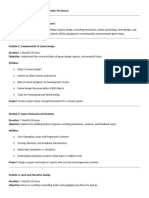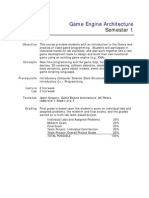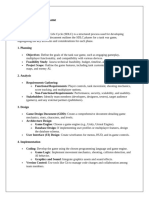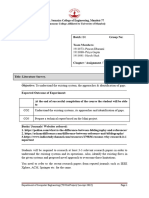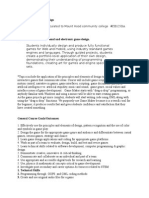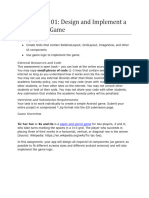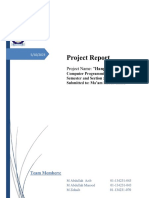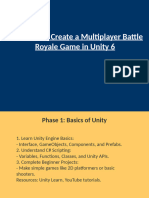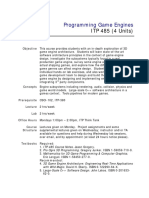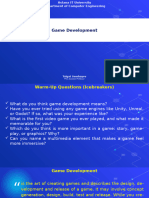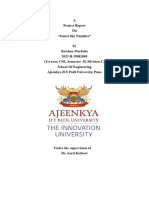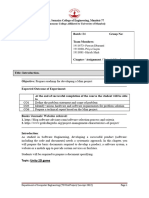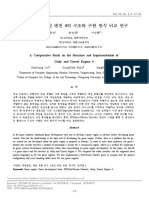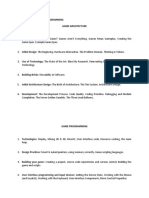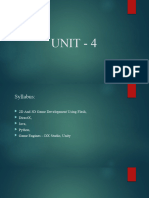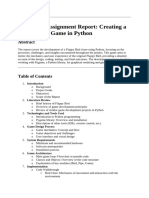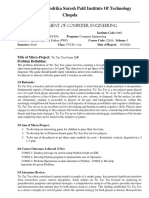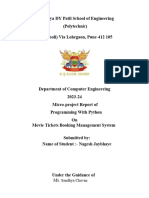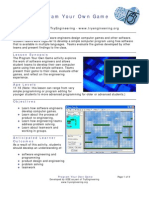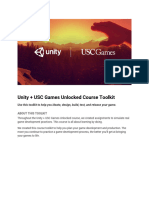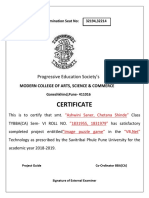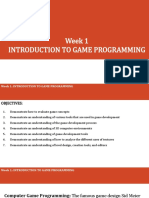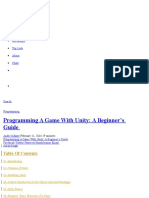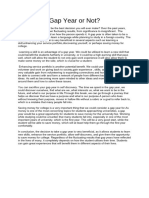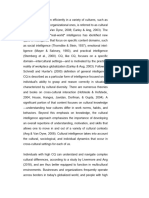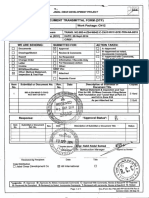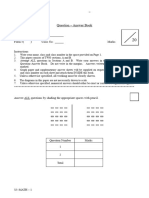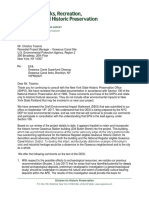Game Design and Development_Updated 14.12.2024
Game Design and Development_Updated 14.12.2024
Uploaded by
mbidhubhushanCopyright:
Available Formats
Game Design and Development_Updated 14.12.2024
Game Design and Development_Updated 14.12.2024
Uploaded by
mbidhubhushanCopyright
Available Formats
Share this document
Did you find this document useful?
Is this content inappropriate?
Copyright:
Available Formats
Game Design and Development_Updated 14.12.2024
Game Design and Development_Updated 14.12.2024
Uploaded by
mbidhubhushanCopyright:
Available Formats
Game Design and Development Syllabus (12 Months/192 Hours)
Part 1: Game Design (3 Months/48 Hours)
Objective: Provide foundational knowledge in game design, including mechanics, player psychology, level design, and
prototyping. By the end of this part, students will be equipped to conceptualize and prototype game ideas.
Module 1: Fundamentals of Game Design
Duration: 1 Month/16 Hours
Objective: Understand the core principles of game design, genres, and essential tools.
Syllabus:
1. What is Game Design?
2. History of Video Games and Genres
3. Role of Game Designers in Development Teams
4. Game Design Documentation (GDD) Basics
5. Tools for Prototyping and Wireframing
Project: Create a basic Game Concept Document for a chosen genre.
Module 2: Game Mechanics and Systems
Duration: 1 Month/16 Hours
Objective: Explore the building blocks of games, including mechanics, systems, and feedback loops.
Syllabus:
1. Core Gameplay Loops and Progression Systems
2. Scoring, Rewards, and Feedback Mechanisms
3. Balancing Complexity vs. Simplicity
4. Prototyping Gameplay Systems Using Paper or Digital Tools
Project: Design a paper prototype of a game with scoring and progression systems.
Module 3: Level and Narrative Design
Duration: 1 Month/16 Hours
Objective: Focus on creating compelling levels and engaging narratives for games.
Syllabus:
1. Basics of Level Design: Flow and Navigation
2. Environmental Storytelling
3. Branching Narratives and Player Choice
4. Rapid Level Prototyping in Unity (No Coding)
Project: Create a mock-up level design and a branching narrative for an RPG.
Part 2: Game Development (9 Months/144 Hours)
Objective: Teach the skills needed to implement and develop fully functional games using Unity. Students will learn
coding basics, multiplayer systems, AI, and deployment.
Module 4: Introduction to Game Programming
Duration: 2 Month/32 Hours
Objective: Learn programming fundamentals and Unity’s scripting system.
Syllabus:
1. Basics of C# Programming (Variables, Loops, Functions)
2. Understanding Unity’s Component System
3. Scripting Game Objects and Simple Interactions
4. Debugging Basics
Project: Create a simple game with interactive objects (e.g., a maze or click-based game).
Module 5: Gameplay Mechanics and Physics
Duration: 2 Months/32 Hours
Objective: Implement advanced gameplay mechanics and use Unity’s physics system.
Syllabus:
1. Player Movement Systems (Walking, Jumping)
2. Physics-Based Interactions (Gravity, Collisions)
3. Power-Ups and Temporary Abilities
4. Animation Integration for Gameplay
Project: Develop a platformer game with collectibles and hazards.
Module 6: Multiplayer Systems
Duration: 2 Months/32 Hours
Objective: Learn the basics of multiplayer game development, networking, and real-time interactions.
Syllabus:
1. Networking Concepts for Games (P2P vs. Client-Server)
2. Synchronizing Game States Across Players
3. Real-Time Interaction (Chat, Leaderboards)
4. Basic Multiplayer Game Prototype
Project: Create a simple multiplayer game (e.g., a 2-player racing game or battle arena).
Module 7: Game AI and Procedural Systems
Duration: 2 Months/32 Hours
Objective: Introduce AI systems and procedural content generation.
Syllabus:
1. Basics of Game AI: Pathfinding
2. AI Behavior, Goal-Oriented AI
3. Procedural Level Generation Techniques
4. Adaptive AI and Difficulty Adjustment
Project: Build a game with AI-controlled characters (e.g., enemies or NPCs).
Module 8: Game Optimization and Deployment
Duration: 1 Month/16 Hours
Objective: Prepare games for deployment across platforms while optimizing performance.
Syllabus:
1. Asset Optimization (Textures, Models, Audio)
2. Performance Profiling Using Unity Tools
3. Cross-Platform Deployment for PC and Mobile
4. Game Marketing and Publishing Basics
Project: Package and publish a complete game prototype to a platform of choice.
Sample Projects for the Course
1. Puzzle Game Prototype (Game Design Focus)
o Design a simple puzzle game with engaging mechanics and level progression.
o Tools: Unity (non-coding prototyping).
2. Platformer with Physics (Game Development Focus)
o Create a 2D platformer game featuring gravity, power-ups, and animations.
o Tools: Unity, C#.
3. Multiplayer Racing Game
o Develop a racing game with real-time multiplayer capabilities and leaderboards.
o Tools: Unity Networking (Photon PUN).
4. AI Adventure Game
o Design a game where AI-driven NPCs interact with the player, creating dynamic challenges.
o Tools: Unity, NavMesh.
5. End-to-End Game Prototype
o Create a fully functional game combining learned skills, from mechanics to deployment.
o Tools: Unity, Unity Profiler for optimization.
[Note: these projects will be embedded with the course based on the student progression, not at the end of the course]
You might also like
- MCV116 Pressure Control Pilot Valve (PCP)Document17 pagesMCV116 Pressure Control Pilot Valve (PCP)Justin100% (2)
- 4.8.2 - Game Architecture and DesignDocument2 pages4.8.2 - Game Architecture and DesignPranil NandeshwarNo ratings yet
- History of Education TimelineDocument13 pagesHistory of Education Timelineapi-557136175No ratings yet
- Game Design and Art_Updated 14.12.2024Document4 pagesGame Design and Art_Updated 14.12.2024mbidhubhushanNo ratings yet
- Swe4011 - Game-Programming - Eth - 1.0 - 55 - Swe4011 - 54 AcpDocument3 pagesSwe4011 - Game-Programming - Eth - 1.0 - 55 - Swe4011 - 54 Acpvpuneeth41No ratings yet
- Game Engine SyllabusDocument9 pagesGame Engine SyllabusBrendon GlanzerNo ratings yet
- 4.8.2 - Game Architecture and DesignDocument2 pages4.8.2 - Game Architecture and Designshashank2shuklaNo ratings yet
- SDLC For Tank War GameDocument2 pagesSDLC For Tank War Gamerimsha ayeshaNo ratings yet
- Chapter2Document7 pagesChapter2ThanosNo ratings yet
- Game Programmer PathDocument5 pagesGame Programmer PathCHRIS CREATORNo ratings yet
- Copy of CGAVR PPTDocument11 pagesCopy of CGAVR PPTManthanNo ratings yet
- Unity3D Course Outline by Saqib JavidDocument68 pagesUnity3D Course Outline by Saqib JavidHabib Ur Rehman100% (2)
- Connect 4Document12 pagesConnect 4Gatot Kesuma WardanaNo ratings yet
- Game Based LearningDocument4 pagesGame Based LearningInternational Journal of Innovative Science and Research TechnologyNo ratings yet
- Project SynopsisDocument9 pagesProject Synopsisshruti raiNo ratings yet
- Game Development Lab ManualDocument22 pagesGame Development Lab Manualchakravarthydhanush71No ratings yet
- Game Design Syllabus 1 WorkDocument3 pagesGame Design Syllabus 1 Workapi-236266376No ratings yet
- Project 2 - AssignmentDocument5 pagesProject 2 - AssignmentUnderMakerNo ratings yet
- Unity from Zero to Proficiency (Intermediate): Unity from Zero to Proficiency, #3From EverandUnity from Zero to Proficiency (Intermediate): Unity from Zero to Proficiency, #3Rating: 2 out of 5 stars2/5 (1)
- Beginning Unity Android Game Development: From Beginner to ProFrom EverandBeginning Unity Android Game Development: From Beginner to ProNo ratings yet
- Assignment 01 TicTacToeDocument2 pagesAssignment 01 TicTacToeMary CrisNo ratings yet
- Obstacles Survivor (Game in Turbo C++)Document15 pagesObstacles Survivor (Game in Turbo C++)Adhikari MilanNo ratings yet
- 01 134231 043 106158104668 19062023 012116amDocument20 pages01 134231 043 106158104668 19062023 012116amstife benzNo ratings yet
- Study for Building GameDocument2 pagesStudy for Building Gamemaulanazulkifli32No ratings yet
- Python Mini Project ReportDocument12 pagesPython Mini Project ReportKetavya ChitranshNo ratings yet
- Graphical Roadmap to Battle Royale Game DevelopmentDocument6 pagesGraphical Roadmap to Battle Royale Game DevelopmentthenostalgiatalksNo ratings yet
- Synopsis SSDocument7 pagesSynopsis SSshivamsaxena3718No ratings yet
- Programming Game EnginesDocument8 pagesProgramming Game EnginesladooroyNo ratings yet
- CCS347 GD - SyllabusDocument1 pageCCS347 GD - Syllabusswetharaghu4311No ratings yet
- Game Design Abstract 2014Document2 pagesGame Design Abstract 2014Nambirajan VanamamalaiNo ratings yet
- Comparative Study On Game EnginesDocument20 pagesComparative Study On Game Enginessayoge4736No ratings yet
- Proposal For Computer Game Production Curriculum: 1. Problem StatementDocument7 pagesProposal For Computer Game Production Curriculum: 1. Problem StatementNaraindas MatiasNo ratings yet
- Bcse416l Game-Programming TH 1.1 0 Bcse416lDocument3 pagesBcse416l Game-Programming TH 1.1 0 Bcse416llucky.pics45No ratings yet
- Lecture 1Document23 pagesLecture 1suirikkulbaiNo ratings yet
- Oop KrishnaDocument18 pagesOop KrishnaKanehaulNo ratings yet
- Chapter1Document7 pagesChapter1ThanosNo ratings yet
- Comm 3330 Interactive Design Syllabus s22Document21 pagesComm 3330 Interactive Design Syllabus s22api-483317232No ratings yet
- A Comparative Study On The Structure and ImplementDocument8 pagesA Comparative Study On The Structure and Implementlahiru bandaranayakeNo ratings yet
- CG&GP CLA-3 Answer KeyDocument5 pagesCG&GP CLA-3 Answer KeySanthosh Kumar PNo ratings yet
- Game On (Div. C) : Dan Nichols National Event SupervisorDocument48 pagesGame On (Div. C) : Dan Nichols National Event SupervisorJL ValenciaNo ratings yet
- Game ArchitectureDocument2 pagesGame ArchitectureMegan VenturianNo ratings yet
- BindiyaDocument91 pagesBindiyaRajniNo ratings yet
- Dusk 2.0Document7 pagesDusk 2.0shivamsaxena3718No ratings yet
- MINIGAMESDocument10 pagesMINIGAMESjaryannarangNo ratings yet
- Unit - 4Document63 pagesUnit - 4sgovinduNo ratings yet
- paper work for gameDocument7 pagespaper work for gamehamzasubhani653No ratings yet
- Game Development Unit 5Document17 pagesGame Development Unit 5zaaya3103No ratings yet
- ASASASDocument5 pagesASASASalimk4978No ratings yet
- Internship ReportDocument11 pagesInternship ReportSahanaNo ratings yet
- PythonDocument5 pagesPythonpatilprathamesh7070No ratings yet
- Python MicroDocument13 pagesPython Microkaruneshk1507No ratings yet
- Android Game: A Project SynposisDocument8 pagesAndroid Game: A Project SynposisKrishan vermaNo ratings yet
- Program Your Own Game: Provided by TryengineeringDocument9 pagesProgram Your Own Game: Provided by TryengineeringHendry AjiNo ratings yet
- Unity + USC Games Unlocked Course ToolkitDocument7 pagesUnity + USC Games Unlocked Course Toolkit4entertainment.comNo ratings yet
- Certificate: Progressive Education Society'sDocument28 pagesCertificate: Progressive Education Society'sShubham KaundinyaNo ratings yet
- Game Engine Programming 2 Week 1Document30 pagesGame Engine Programming 2 Week 1Dean LevyNo ratings yet
- Game Builder Level 1Document22 pagesGame Builder Level 1mark.lindseyNo ratings yet
- Programming A Game With Unity: A Beginner's Guide: PC & Mobile Lifestyle Hardware Deals Giveaways Top Lists About ChatsDocument71 pagesProgramming A Game With Unity: A Beginner's Guide: PC & Mobile Lifestyle Hardware Deals Giveaways Top Lists About ChatsladooroyNo ratings yet
- Defensa Ariel LunaDocument14 pagesDefensa Ariel LunaEuly CorralesNo ratings yet
- A survey of computer game developmentDocument13 pagesA survey of computer game developmentmonia.naomyNo ratings yet
- Space Shooter GameDocument18 pagesSpace Shooter GameSowmya Srinivasan100% (2)
- محلول Model 45-- 46Document44 pagesمحلول Model 45-- 46amn1918j76No ratings yet
- Ethical Environment of The FirmDocument4 pagesEthical Environment of The FirmcajfloreteNo ratings yet
- 6.R.The Little Ice AgeDocument3 pages6.R.The Little Ice Agems.pannupyonehlaingNo ratings yet
- Material Submittal - GRP Sectional Panel TanksDocument204 pagesMaterial Submittal - GRP Sectional Panel Tanksmohamed kamalNo ratings yet
- Snow Load: Table 5.4.1 The Combination Value, Frequent Value and Quasi-Permanent Value of Crane LoadsDocument1 pageSnow Load: Table 5.4.1 The Combination Value, Frequent Value and Quasi-Permanent Value of Crane LoadsMechanicalNo ratings yet
- Lab 1Document4 pagesLab 1Muhammad TehreemNo ratings yet
- Author Information - Basic - 13595Document5 pagesAuthor Information - Basic - 13595Dikshant VatsNo ratings yet
- Section (A), (B) (C) : General Facts About Elements, Based On Periodic Trends Based On Chemical BondingDocument28 pagesSection (A), (B) (C) : General Facts About Elements, Based On Periodic Trends Based On Chemical BondingAnuragPandeyNo ratings yet
- Sons of Ether RevisedDocument108 pagesSons of Ether RevisedAPCommentator100% (3)
- Crime in The Making Pathways and Turning Points THDocument30 pagesCrime in The Making Pathways and Turning Points THsandrade201522No ratings yet
- 5 6156503420275525273Document224 pages5 6156503420275525273sumo khanNo ratings yet
- Iit Maths Solved PaperDocument569 pagesIit Maths Solved PaperAshish Gupta100% (2)
- Mathematics in Science and Technology - Siddiqi PDFDocument556 pagesMathematics in Science and Technology - Siddiqi PDFJuan Rubén Cueva Salaverry100% (1)
- Jews With Attitude - JuhuroDocument3 pagesJews With Attitude - JuhuroYaakov CantorNo ratings yet
- City of Mansfield - GENERAL NOTESDocument4 pagesCity of Mansfield - GENERAL NOTESjohnstanley123No ratings yet
- Chapter 1 NotesDocument5 pagesChapter 1 NotesgesuNo ratings yet
- HDL 64E Data SheetDocument2 pagesHDL 64E Data SheetHermanto ChuaNo ratings yet
- Determine Your FutureDocument1 pageDetermine Your Future01ahmedali01No ratings yet
- Expression Used in Job InterviewDocument10 pagesExpression Used in Job InterviewTikTok VideoNo ratings yet
- Theoretical Issues in Contrastive Linguistics - (CONTRASTILE ANALYSIS AND THE MODERN THEORY OF LANGUAGE)Document58 pagesTheoretical Issues in Contrastive Linguistics - (CONTRASTILE ANALYSIS AND THE MODERN THEORY OF LANGUAGE)felixdelacruzz2021No ratings yet
- CQ ESSAY (AutoRecovered) Redesigned 2Document12 pagesCQ ESSAY (AutoRecovered) Redesigned 2labibahmed706No ratings yet
- MICROMERITICSDocument80 pagesMICROMERITICSNEEMASUBINNo ratings yet
- TRN 0515 B PDFDocument15 pagesTRN 0515 B PDFrayNo ratings yet
- F5math1112t2 AbDocument4 pagesF5math1112t2 AbsrtvzdpbbmNo ratings yet
- Kobeissy PDFDocument695 pagesKobeissy PDFSchooch NibblleNo ratings yet
- SHPO Letter 10 19 2017Document2 pagesSHPO Letter 10 19 2017brownstonerNo ratings yet
- Hanan Ahmad - h00271779 - Lesson Plan 3Document3 pagesHanan Ahmad - h00271779 - Lesson Plan 3api-301077191No ratings yet
- 9015 AgDocument26 pages9015 AgPremilla MillicanNo ratings yet



